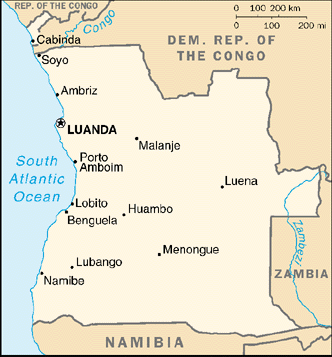

Status Quo Side: Portugal
Non-Status Quo Side: Indigenous rebel groups
Region: Africa
Conflict Type: Colonial
Issues in Dispute: Independence
Maps: [UTexas Angola maps]
The indigenous African population far outnumbered the colonial elite but was excluded from the electorate and subjected both to Christian proselytizing and repressive labor policy.
Anti-colonial sentiment spreading throughout Africa was reflected in mounting opposition in Angola (and Portugal) to Portuguese dictator Antonio de Oliveira Salazar. The Portuguese expanded their military presence as their policies toward their African colonies attracted international attention and UN disapproval. The first of three competing indigenous nationalist forces, the MPLA (Popular Movement for the Liberation of Angola), mobilized in 1956 under Dr. Antonio Agostinho Neto.
Riots occurred in the capital, Luanda, followed by a series of violent upheavals in which two other exile groups took part: the FNLA (Front for the Liberation of Angola) under Holden Roberto, and UNITA (National Union for the Total Independence of Angola) under Dr. Jonas Savimbi. The dissidents, hampered by competition between them, were no match for an efficient and ruthless regime. The UN proved powerless, given the unwillingness of Portugal's NATO allies --the US and the UK -- to bring pressure. Some major legal and social reforms accompanied the repression.
Sporadic clashes continued to occur between supporters of the three exile groups. A military coup in Portugal in April 1974 led to dissolution of the empire. Fighting between rival nationalist groups resulted in Portugal granting independence to the Angolan people rather than any organization.
The MPLA declared itself the government of Angola. [see ACW]
Copyright © 1999 Lincoln P. Bloomfield and Allen Moulton